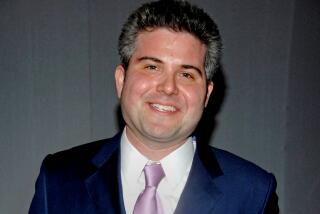This Book Award Recipient Was Taken Aback
NEW YORK — The first rumblings he heard connecting his name to the new National Book Awards medal for “distinguished contributions to American letters” reminded Jason Epstein of an episode of “The Honeymooners,” the old Jackie Gleason television show.
That would be the scene in which Ralph Kramden learns that one of the members of the Raccoons, his lodge, is about to receive a special citation for meritorious service. But when the leader of the order, the Great Raccoon, comes to Ralph’s apartment, the viewer realizes immediately that Ralph has been given the honor of introducing his old friend Ed Norton, winner of the award.
“I had been awaiting a similar visit,” Epstein deadpanned last week.
Instead, there was the Random House editorial director standing before a packed ballroom at the Pierre Hotel here acknowledging his selection as the first recipient of an award conceived to honor “an individual--an author, publisher, editor--someone long connected with books who has had an extraordinary and permanent impact on American letters.”
Obviously, a National Book Awards spokesman said, Epstein fit the bill. The “boy wonder” Epstein founded Anchor Books, the first quality American paperback line, when he was just 24 and still an editor at Doubleday. His first acquisition for Anchor was Stendahl’s “The Charterhouse of Parma.”
Authors Listed
As an editor at Random House these last 30 years, Epstein has listed among his authors W. H. Auden, Edmund Wilson, Vladimir Nabokov, Oscar Lewis, Jane Jacobs, Norman Mailer, Gore Vidal, Robert Ludlum, Elaine Pagels and E. L. Doctorow.
During the New York newspaper strike of 1963, Epstein borrowed $4,000 from Robert Lowell’s trust fund and started the New York Review of Books. In 1972, Epstein acted on an idea that he and Edmund Wilson had discussed as early as 1962, and launched the Library of America, a collection of books by America’s greatest authors that now has 42 titles in print. Epstein has said that his own idea of a monument would be to have the Libary of America available in high school libraries around the country--a project that began this year in California.
Now, concerned that the proliferation of chain and discount bookstores is actually limiting readers’ access to broad selections of literature, Epstein has dreamed up a Reader’s Catalogue to annotate available books on subjects ranging from golf to Renaissance art. This enormous undertaking is scheduled to make its debut sometime in 1989.
“Besides that, he’s a fabulous cook and he travels all the time. He’s sui generis, one of those people for whom there are 36 hours in the day,” said Cheryl Hurley, publisher of Library of America.
Still, Epstein said he was “dumbfounded” to have been chosen for the NBA’s $10,000 “distinguished contribution” award.
“I have always thought of my relationship to literature as that of a valet,” he said.
“A publisher’s function, I have thought, requires an odd kind of ego,” Epstein went on. “My few achievements in this trade are in other words mainly the result of frustration and impatience on the part of the writers I have served.”
Random House ‘University’
Publishing, Epstein said, is “not so much a career as an education.” And Random House, he said, “has for 30 years been my university.”
Some in publishing found the new prize reminiscent of the Thalberg Award presented each year at the Academy Awards ceremony. Others groused that the $10,000 should have been donated in the winner’s name to some cause or project related to publishing, such as an anti-illiteracy program or a funds-strapped library.
But such complaints did not dare make their way to the ballroom of the Pierre Hotel, where the National Book Awards ceremony was once again held. When the names of fiction winner Pete Dexter and nonfiction winner Neil Sheehan were announced, whoops came up from the Random House tables that sounded as if their favorite football team had just won a bowl championship.
One judge revealed that the choice had been particularly difficult this year. He and his fellow judges received “several hundred” submissions in the nonfiction category, Prof. John Garraty said. As if life weren’t complicated enough, “I was several chapters into some of them before I realized that what I was reading was a novel, not a work of nonfiction,” Garraty said.
More to Read
Sign up for our Book Club newsletter
Get the latest news, events and more from the Los Angeles Times Book Club, and help us get L.A. reading and talking.
You may occasionally receive promotional content from the Los Angeles Times.







